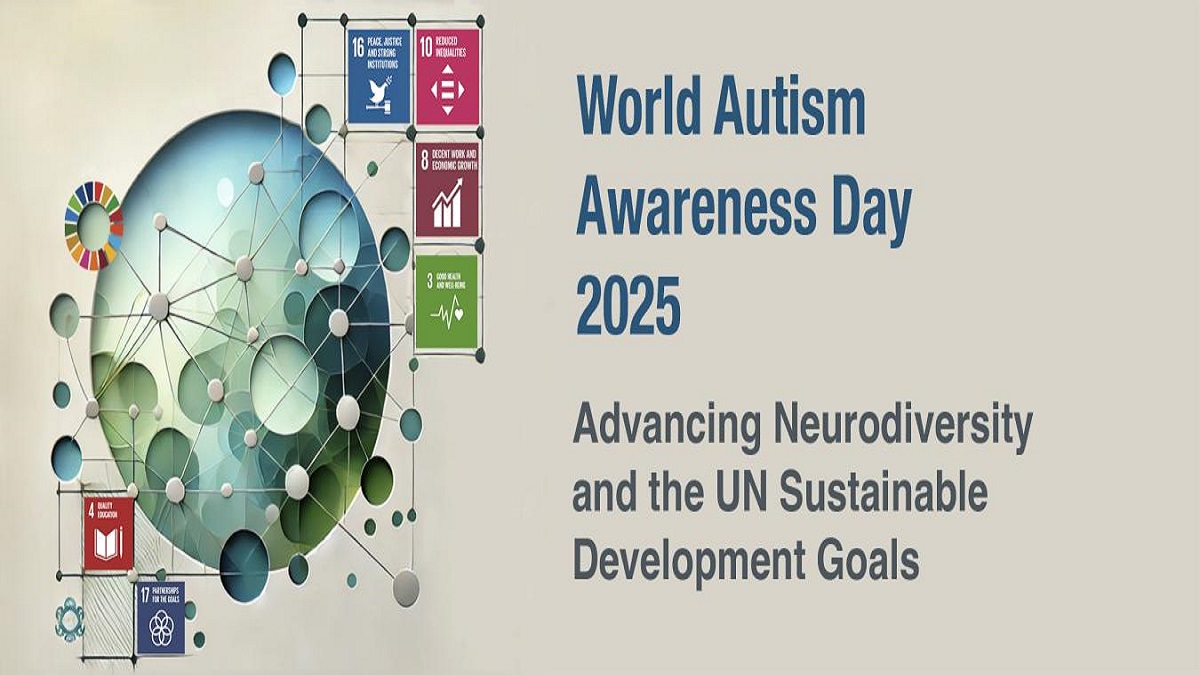The United Nations (UN) observes World Autism Awareness Day (WAAD) on 2 April 2025 under the theme “Advancing Neurodiversity and the UN Sustainable Development Goals (SDGs)”. This year’s observance focuses on the intersection between neurodiversity and global sustainability efforts, highlighting how inclusive policies and practices can support autistic individuals and contribute to achieving the SDGs. The event is organized by the Institute of Neurodiversity (ION), in collaboration with the United Nations Department of Global Communications.
Introduction
World Autism Awareness Day (WAAD) was established by the United Nations General Assembly (UNGA) in 2007 through Resolution A/RES/62/139, with the objective of promoting awareness and understanding of autism. Over the years, the focus has expanded from merely raising awareness to promoting acceptance, inclusion, and the recognition of the contributions of autistic individuals to society. The 2025 observance aligns autism awareness with the UN Sustainable Development Goals (SDGs), emphasizing inclusive healthcare, education, employment, and urban development.
Background of World Autism Awareness Day
Origins and Purpose
- In 2007, the United Nations General Assembly designated 2 April as World Autism Awareness Day.
- The primary aim was to raise awareness about autism spectrum disorder (ASD) and promote the rights of autistic individuals.
- Since its inception, the global movement has shifted from awareness to acceptance and inclusion, recognizing the value and contributions of autistic individuals.
Global Progress and Advocacy
- Over the past 17 years, autistic self-advocates, researchers, and organizations have worked to amplify the voices and experiences of neurodiverse individuals.
- Increased awareness has led to better policies, educational frameworks, and employment opportunities for autistic individuals.
World Autism Awareness Day 2025: Theme and Objectives
Theme: “Advancing Neurodiversity and the UN Sustainable Development Goals (SDGs)”
The 2025 observance highlights how neurodiversity plays a critical role in achieving the SDGs, with a particular focus on:
- Inclusive healthcare
- Quality education
- Workplace accessibility
- Reducing inequalities
- Designing autism-friendly cities
This year’s discussions emphasize the importance of inclusive policies that promote accessibility, equality, and innovation across multiple sectors.
Key Highlights of the 2025 Observance
1. Event Structure
- Organized by Institute of Neurodiversity (ION) with support from UN Department of Global Communications.
- Features keynote speeches, panel discussions, and interactive sessions.
- Participants include global experts, policymakers, autistic individuals, and advocacy groups.
2. Major Discussion Areas
- Inclusive Healthcare: Addressing barriers to healthcare access for autistic individuals.
- Quality Education: Promoting accessible and inclusive learning environments.
- Employment Opportunities: Encouraging workplace accessibility and neurodiverse hiring practices.
- Urban Development: Designing autism-friendly cities and public spaces.
- Policy Advocacy: Developing legislations that safeguard the rights of autistic individuals.
3. Role of the Institute of Neurodiversity (ION)
- Headquartered in Switzerland, with a presence in 40 countries.
- Founded and led by neurodiverse individuals.
- Works to empower neurominorities, advocate for equal opportunities, and promote neurodiversity education.
Impact of World Autism Awareness Day 2025
1. Strengthening Global Dialogue
- WAAD 2025 fosters cross-sector collaborations to eliminate barriers for autistic individuals.
- Promotes the need for inclusive policies in healthcare, education, and employment.
2. Increasing Recognition and Acceptance
- Encourages societal appreciation of autistic contributions.
- Supports the integration of neurodiverse individuals in mainstream activities.
3. Advancing the UN Sustainable Development Goals (SDGs)
- Supports Goal 3 (Good Health and Well-being) through inclusive healthcare initiatives.
- Promotes Goal 4 (Quality Education) by advocating for inclusive learning environments.
- Aligns with Goal 8 (Decent Work and Economic Growth) by emphasizing equal employment opportunities.
- Addresses Goal 10 (Reduced Inequalities) by tackling discrimination against autistic individuals.
- Encourages Goal 11 (Sustainable Cities and Communities) by promoting autism-friendly infrastructure.
Summary of World Autism Awareness Day 2025
| Aspect | Details |
|---|---|
| Date | 2 April 2025 |
| Theme | “Advancing Neurodiversity and the UN Sustainable Development Goals (SDGs)” |
| Organizers | Institute of Neurodiversity (ION) with support from UN Department of Global Communications |
| Key Focus Areas | Inclusive healthcare, education, employment, urban development, reducing inequalities |
| Main Participants | Global experts, policymakers, autistic self-advocates, advocacy groups |
| Key Initiatives | Policy discussions, accessibility projects, workplace inclusion efforts |
| Impact | Strengthening global policies, raising awareness, promoting autism-friendly infrastructure |
| Alignment with SDGs | SDG 3 (Good Health), SDG 4 (Quality Education), SDG 8 (Decent Work), SDG 10 (Reduced Inequalities), SDG 11 (Sustainable Cities) |



 Shivaji Maharaj Jayanti 2026: Why 19 Feb...
Shivaji Maharaj Jayanti 2026: Why 19 Feb...
 Sri Ramakrishna Jayanti 2026: A Tribute ...
Sri Ramakrishna Jayanti 2026: A Tribute ...
 National Women's Day 2026 India: Signifi...
National Women's Day 2026 India: Signifi...








